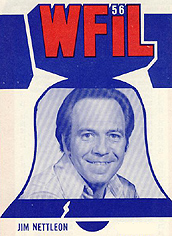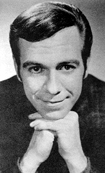
©
2007-2026
Man From Mars Productions
|
Jim
Nettleton
|
 |
|
|
|
A: Yes, Dick had a very severe bout with strep throat at the time, so we taught the first class. Q: Later, in Philadelphia, you and Long John worked together at WFIL. Did you play any role in his broadcasting school? A: No, I wasn't involved in that one. Q: What do you remember about 869 Blue Hills Avenue? The studios certainly weren't as palatial as the later digs at 750 Main Street. A: That it was mighty crowded. Fortunately all of us were pretty slim in those days or we wouldn't have been able to fit in the recording booth. But I was just thrilled to be there at a station that I considered one of the top 3 or 4 Top 40s in the country. |
|
|
Q: January 1965 marked the arrival of Sandy Beach in you 1-4PM time slot; you took over 10AM-1PM. A: That was a pretty strong lineup. You just answered what I was wondering about earlier about 10AM-1PM. Yeah, Sandy was a funny man - always a lot of laughs with him around. And what can you say about Ron Landry? One of the very best morning men ever. A: I actually did a lot of that kind of thing for the station, including writing and delivering many editorials. I've always written over the years. I've written 3 books and a ton of articles for the entertainment sections of a few newspapers. In the case of the UFO documentary, it is a subject about which I've long been fascinated and I am to this day totally convinced that we have never been told the truth. |
 Jim Nettleton at WFIL - April 1976 |
Q: In 1966 you departed Hartford for WFIL. I believe you were on their inaugural staff as the station switched to a pop music format. Again, were you recruited or did you apply? Did Buckley own WIBG in Philadelphia at that point; if so, was there any thought of transferring there instead of WFIL? A: I think it was Sandy Beach who mentioned the coming change in Philadelphia to me. I sent an aircheck and they called me within a week. Within the month I was in Philly as part of the original staff. Ironically, at the same time I received an offer from WMEX in Boston, my home town. The urge to take it was strong, naturally, but I felt that WFIL was going to accomplish big things. Good decision. Buckley bought WIBG sometime later. At the time, WIBG was owned by Storer. Q: A few months later Long John also jumped ship for WFIL. Did you put in a good word for him? A: Absolutely. Frank Kingston Smith was leaving and I told Jim Hilliard, our PD, that he needed to take a look at Long John, that he'd be a perfect fit. |

